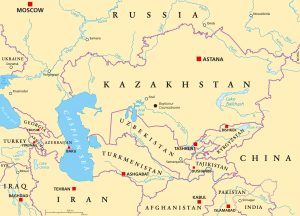On the surface, every single Central Asian state climbed in Reporters Without Borders’ just-released annual World Press Freedom ranking. Kazakhstan leapt from 155 out of 180 countries to 122, Kyrgyzstan rose from 79 to 72, Tajikistan from 162 to 152, and Uzbekistan surged from 157 to 133. Even Turkmenistan moved up, from 178 to 177.
When you look past the ranks, however, a different picture emerges. Every country in Central Asia (with the exception, paradoxically, of Turkmenistan) saw its actual score decline even as its ranking rose. This enables governments to herald an improving rank as a sign of progress, regardless of the underlying decline or the stagnation of press freedoms in the region.
On Twitter, Polish journalist Agnieszka Pikulicka-Wilczewska remarked: “Last year was pretty nightmarish for journos in #Uzbekistan and yet in your ranking, it has jumped from 157th position to 133rd.”
Pikulicka-Wilczewska (who has written often for The Diplomat) is writing from experience: In November 2021, after living in Tashkent for three years, she was denied re-entry into Uzbekistan at a border crossing with Kazakhstan. Earlier in the year, Uzbek authorities had denied her request to renew her accreditation after a six-month limbo in which Pikulicka-Wilczewska said she was subjected to sexual harassment by a Ministry for Foreign Affairs employee. After she went public with her complaints, Pikulicka-Wilczewska’s accreditation was extended and the ministry apologized, but it was a temporary reprieve.
In March 2021, Miraziz Bazarov, an Uzbek blogger who championed LGBT rights, was savagely beaten. His attackers were never identified, but Bazarov remains under house arrest and is facing charges over allegations of libel. In reporting on Bazarov’s case, and discussing her own troubles with the authorities, Pikulicka-Wilczewska became the target of an online harassment campaign. Her accreditation was ultimately revoked and she was, as noted above, banned from returning to Uzbekistan.
None of this was mentioned in the brief RSF country overview for Uzbekistan.
Although every Central Asian state rose in the rankings, their individual scores all declined (with the exception of Turkmenistan). For example, although Uzbekistan’s rank rose 24 places, its score declined from 49.26 in 2021 to 45.74 in 2022. Tajikistan’s rank rose 10 spots, but its score declined from 44.48 to 40.26. (According to the ranking’s methodology a score of 100 reflects “good” press freedom and 0 entails a “very serious” situation.)
There are a few issues at play that deserve explanation, most importantly a change in methodology.
The ranking changes are particularly difficult to assess because for the 2022 report Reporters Without Borders (RSF) used a new methodology. “In order to reflect press freedom’s complexity, five new indicators are now used to compile the Index: the political context, legal framework, economic context, sociocultural context, and security,” RSF noted. Each indicator was assessed by RSF using a combination of a quantitative survey of violations and a qualitative study based on responses form journalists, academics, and activists to a 123-question survey. The score for each indicator is then averaged to produce a single score and the rankings are built from that score.
The switch to a new methodology complicates comparing the 2022 ranking to 2021, something RSF notes in its overview, but which has not made it into regional media coverage of the index.
An additional issue is one of display and a lack of context: On each country page for RSF index, the 2021 ranking is listed beside the 2022 ranking, with a small green or red arrow indicating a direction. The actual scores are printed in smaller text and displayed below the rankings. On account of the methodology shift, there is no comparing the indicator scores from the 2022 index to previous years. The individual country pages, called “fact-files,” also do not mention the change methodology and offer only the briefest of explanations for each indicator.
Methodology is not a headline buzzword, but a better score on an international ranking is. It’s easy for officials to gloss over the details and hold up an improved ranking as a sign of progress, even when the underlying score has declined and the circumstances have not really changed.
On Telegram, Uzbek presidential spokesman Sherzod Asadov swiftly congratulated the Uzbek media on the rising rank, citing it as a result of the leadership of President Shavkat Mirziyoyev on ensuring the freedom of speech in the country.
A little over a year ago, Mirziyoyev signed into law a bill that criminalized “insult and slander” of the president online. That’s not a sign of an improving press environment, but the new law didn’t merit a mention in the Uzbekistan country page.

































